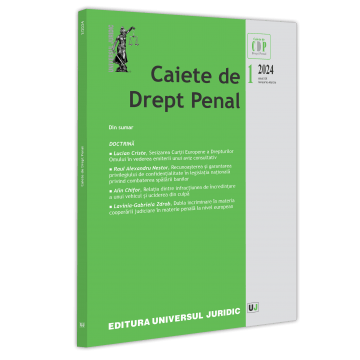Double criminality in judicial cooperation in criminal matters at the European level
Abstract
This paper seeks to analyse the institution of double criminality as a procedural condition for various judicial cooperation procedures in criminal matters in the European legal system.
The analytical approach will begin by establishing the legal nature of double criminality, which has been the subject of an extensive legal doctrinal debate. The study will tackle the main arguments presented and will comment on the consequences of each one, establishing why a certain view of double criminality is preferable over another.
Next, the author will focus on how the requirement of double criminality is assessed in transnational criminal proceedings, focusing on the in concreto-in abstracto dichotomy, as it has been promoted in the legal literature. This section of the study will be built around the case-law of the Court of Justice of the European Union, which, as it will become apparent throughout the paper, has promoted a view that is not free of inconsistencies in regard to identical issues. The author will try, as well, to discuss the way in which the case law of the European Court and the guiding principles on the assessment of double criminality have been transposed nationally.
In addition, the author will analyse the situations in which the double criminality check is abolished, having as a starting point the rationale behind the choice of those specific criminal behaviours.
Finally, the author will also consider the possible problems arising in regard to the effectiveness of the cooperation procedures, by trying to establish whether the 32 offences on the list can be harmonised at an European level so as to protect the effectiveness of the cooperation procedures.

